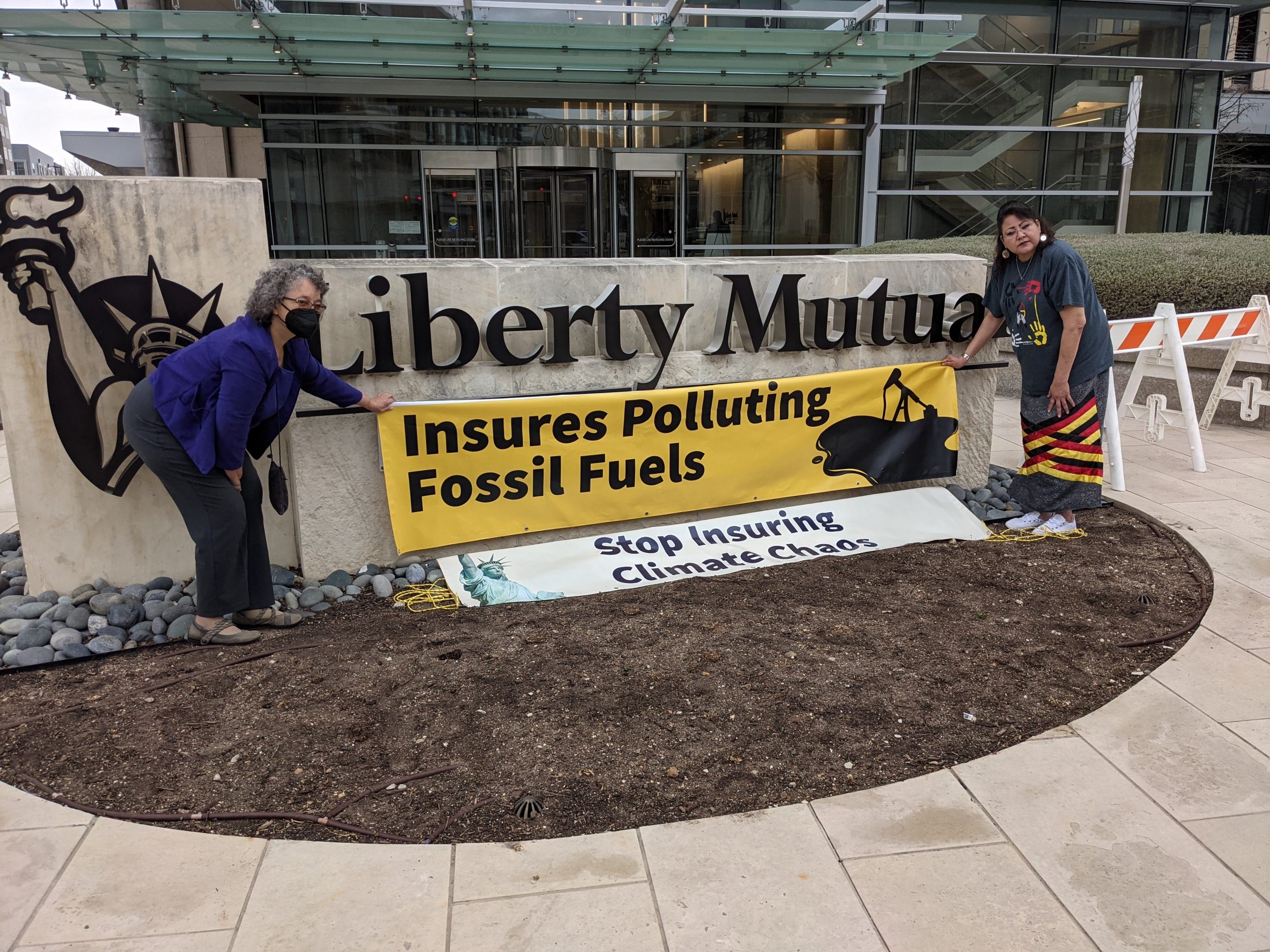Environmentalist, Indigenous rights activists protest at Liberty Mutual’s Plano campus
This article by Garrett Gravley originally appeared in the Plano Star Courier on March 19, 2021.
Climate activists and Indigenous rights organizers staged a protest in front of insurance giant Liberty Mutual’s Plano campus in the 7900 block of Windrose Avenue on Monday morning.
The demonstration was organized by the Texas Campaign for the Environment (TCE) with a stated objective of getting Liberty Mutual to stop making itself essential to energy projects with an adverse environmental impact.
“Big insurance companies like Liberty Mutual are basically essential for making sure that fossil fuel projects go forward. What Liberty Mutual is involved in is both insuring and funding major fossil fuel expansion projects,” explained TCE program coordinator Kevin Richardson, who cited the Trans Mountain pipeline in Canada and the Baralaba South coal project in Australia as examples. “Liberty Mutual, as far as we know, has invested and [insured] a number of big projects like that, but there’s also a ton of projects we don’t know if they’re investing in because there’s not a lot of transparency about what they insure and who they invest in.”
He continued, “We’d like to see them, one, focus on keeping all the stuff in the ground, and then, two, invest [in] and start insuring and focusing on renewable energy and other climate projects, building renovations and things like that.”
Perhaps most infamously, Liberty Mutual reportedly insured and invested in the Keystone XL pipeline’s fourth construction phase, which would have had terminals from Alberta, Canada to Nebraska. This phase of the pipeline’s construction attracted ire from environmentalists and Indigenous groups alike, which led to a series of protests around the Standing Rock Indian Reservation in North and South Dakota in 2016. President Joe Biden revoked the permit for the pipeline’s fourth phase through an executive order in January.
“The Standing Rock Sioux tribe fought so hard because they know that no pipeline is safe, and when this pipeline bursts or leaks, it will go into the waterway that services millions of people,” said Yolonda Blue Horse, director of the Indigenous Cultures Institute at the Memnosyne Foundation and co-founder of the Society of Native Nations in Texas. “People never take time anymore to appreciate what is around us. … We are literally destroying all of this beauty around us.”
Blue Horse was one of the key demonstrators at Monday’s protests, and in what other activists considered a breakthrough moment, Liberty Mutual officials made themselves available to her for a private meeting.
“By all accounts, this is the first time the company has given an Indigenous leader any opportunity to speak face-to-face (in person or virtually) with any Liberty Mutual officials, despite more than a year of demanding to do so,” TCE said in a press release.
Still, Blue Horse said the talks did not go far enough. As she put it, “Any time given the opportunity to speak, one wants to wish that your words about how important it is to protect the earth is well-received. However sadly, the dollar bill and how much bigger one’s bank account can get becomes the priority.”
She recalled, “When I spoke to the representatives of Liberty Mutual, I asked them, ‘When is the last time you actually looked outside? Looked beyond the buildings, beyond your bank accounts and actually really looked at what Mother Nature gave you?’”
When asked to comment on the demonstrations, a spokesperson for Liberty Mutual said, “We recognize the risk of climate change to our planet and environmental sustainability has been a key focus for us for some time. We are taking action and have a long-term strategy of decarbonization and investment in renewable energy. We’re taking many steps that demonstrate our commitment to the shift toward clean energy, and we will continue to improve and build on the progress we’ve made.”
The spokesperson then provided a PDF document of Liberty Mutual’s 2019 “Environmental, Social and Governance Review,” which said, “We believe we need to keep expanding our green energy portfolio in parallel with gradual divestments from fossil fuels. Suddenly boycotting fossil fuels would cause more harm than good.” The document cites as reasons for this the “prohibitively expensive” nature of such a transition, unresolved shortcomings of renewable energy resources that are still being improved, the energy intensity of such infrastructure (“it usually takes fossil fuel power to build wind turbines and solar panels”) and the job loss that would come with rapidly divesting from the fossil fuel industry.
Despite this, Liberty Mutual has still granted incremental concessions to protesters. In December of 2019, the company announced it would no longer accept underwriting for companies that make more than 25% of their revenue from coal production.
Richardson said this was a victory for TCE’s cause, but that more work needs to be done. “They’re small openings, and that’s a good thing, but we need to keep the pressure on them to make much larger steps because we’re running out of time,” he said.

